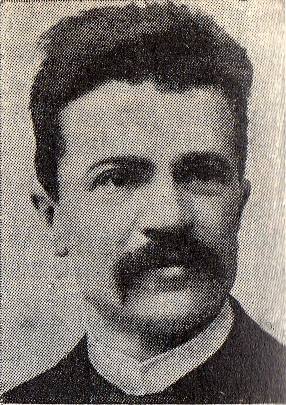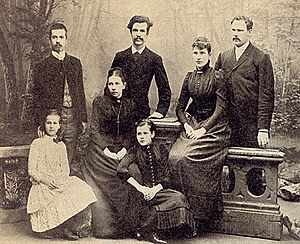Kaarle Krohn facts for kids
Quick facts for kids
Kaarle Krohn
|
|
|---|---|
 |
|
| Born | 10 May 1863 |
| Died | 19 July 1933 (aged 70) |
| Academic background | |
| Alma mater | University of Helsinki |
| Influences | Julius Krohn, Elias Lonnrot |
| Academic work | |
| School or tradition | Fennoman |
| Main interests | Finnish mythology, Kalevala Scholarship |
Kaarle Krohn (born May 10, 1863 – died July 19, 1933) was a famous Finnish expert in folklore. He was a professor and helped create a special way to study old stories. This method is called the geographic-historic method. Kaarle Krohn came from an important family in Helsinki, Finland. He is most famous for his work on folktales around the world. He spent much of his life studying the Kalevala, which is Finland's national epic poem.
Early Life and Studies
Kaarle Krohn was born in Helsinki, Finland. His father, Julius Krohn, was a journalist and a poet. Kaarle had three sisters who also became famous Finnish writers: Aune Krohn, Helmi Krohn, and Aino Kallas.
Kaarle was a very bright student. He finished his high school exams in 1880. He then went to the University of Helsinki. By 1883, he earned his first degree. He completed his doctorate degree in 1888.
When he was just 18, Kaarle traveled to northern Karelia to do research. From 1884 to 1885, he traveled across Finland. He collected many examples of Finnish folklore. He especially looked for folktales. He thought these stories had not been studied enough.
His doctoral paper was about animal tales. It was called "Bear (wolf) and fox: A Nordic animal-tale chain." This paper used his father's special research method. It quickly made Kaarle famous around the world.
A Career in Folklore
In 1888, Kaarle Krohn started teaching at the University of Helsinki. He became a professor of Finnish and comparative folklore. In 1908, he became the first person to hold a permanent professor position in this field.
Kaarle also helped start important groups and magazines. In 1907, he created the Federation of Folklore Fellows' Communications. He did this with his friends Johannes Bolte and Axel Olrik. In 1917, he became the chairman of the Finnish Literature Society. He also helped start two magazines: Virittäjä and Finno-ugrische Forschungen. These magazines focused on Finnish and Finno-Ugric research.
The Kalevala and Its History
Kaarle Krohn spent a lot of time studying the Kalevala. This is Finland's national epic poem. In 1918, he published a two-volume book called Kalevala Questions. This book was for students studying Finnish folk poetry.
In this book, Krohn changed his ideas about the Kalevala. He used to think the Kalevala grew from small "poetic germ cells." These small parts then joined together to form a big epic story. But in Kalevala Questions, he said something different. He now believed the poems were created as complete works. Over time, they broke into smaller pieces.
Krohn also thought these poems were made during the Scandinavian Viking Age. He believed they told stories of real historical events. This was a big change from his earlier ideas. He had once thought the Kalevala was from the Middle Ages. He also thought it borrowed a lot from religious stories.
Krohn said his new ideas came from more research. But he also admitted that the political situation in Finland influenced him. Finland was going through big changes at that time. Krohn wrote that Kalevala studies were also changing.
Eight years later, he rewrote his book for people outside Finland. He added examples of folktales. This new book was called Folklore Methodology. It became a very important guide for studying folklore.
Later Research
In 1932, a year before he passed away, Kaarle Krohn returned to folklore research. He wrote a review of international folktale studies. This review was based on the special method he had developed. It was called "A Review of Some Results of Folktale Research."
|
 | Stephanie Wilson |
 | Charles Bolden |
 | Ronald McNair |
 | Frederick D. Gregory |


